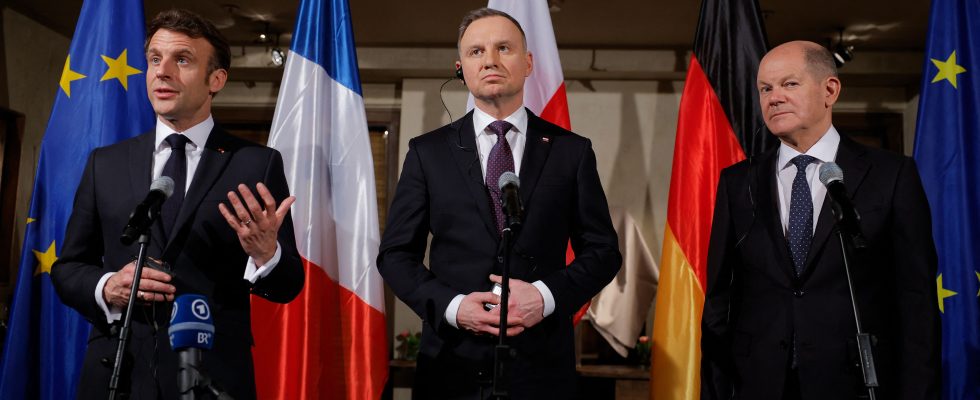It’s a dinner, organized at the Elysée this Monday, June 12 at the Elysée, where Ukraine will be on the menu of discussions. French Presidents Emmanuel Macron, Polish Andrzej Duda and German Chancellor Olaf Scholz will coordinate on military aid and security guarantees to be provided to Ukraine during this working meal organized within the framework of the Weimar Triangle.
This dinner will prepare the next NATO summit on July 11 and 12 in Vilnius, of which Ukraine will be at the heart, as well as the European Council on June 29 and 30. Emmanuel Macron will first meet bilaterally with Andrzej Duda, whose country is one of the strongest in supporting Ukraine in the face of the Russian offensive and in denouncing Russian threats in Europe.
The three leaders will then discuss together, during a dinner, “the necessary European coordination in the military assistance to be provided to Ukraine to enable it to carry out its counter-offensive as well as in humanitarian assistance, in particular to following the attack on the Kakhovka dam,” the Elysee Palace said on Friday.
“It will also be a question of the security guarantees that can be provided to Ukraine, over time, in order to guarantee its sovereignty and its territorial integrity”, added the French presidency. “This is an excellent initiative from the Elysée and it is really the right format to discuss these subjects”, declared this Monday on LCI Bruno Tertrais, deputy director of the Foundation for Strategic Research (FRS).
A format for dialogue and cooperation
The so-called Weimar format is a platform for regular exchanges between Paris, Berlin and Warsaw. The last meeting between the three countries was held on February 19, in Germany, on the occasion of the Munich Security Conference.
This diplomatic format bringing together the three countries, which takes the name of this city where the Constitution of the Weimar Republic (1918-1933) was established, was founded in 1991, two years after the fall of the Berlin Wall. The aim of this cooperation was then to prepare and support Poland’s accession to NATO and the European Union (EU) and to support German-Polish reconciliation, inspired by the Franco-German experience.
As reminded the Ministry of Foreign Affairs on its website, after Poland’s accession to the EU in 2004, “the format evolved into that of a forum for consultation upstream of European negotiations”. Within the framework of the Triangle, high-level meetings take place regularly. Achievements are also taking shape, both in the fields of foreign affairs and defence, as well as culture and research, specifies the Quai d’Orsay.
“We haven’t used this format a lot and it’s a shame when historically and geopolitically, we can see that these three countries are the heart of Europe”, said Bruno Tertrais on Monday.
The diplomatic cold snap between Paris and Warsaw
Significant fact of the Weimar Triangle, as TF1 reminds : in 2014, Ministers Laurent Fabius, Frank-Walter Steinmeier and Radoslaw Sikorski made a joint trip to kyiv. The objective was to negotiate a way out of the crisis between President Victor Yanukovych and the Ukrainian opposition. The signing of an agreement had made it possible to put an end to the violence and to launch a political transition after the flight of the Ukrainian head of state to Russia.
The Weimar Triangle has experienced some upheavals. On October 28, 2016, Polish President Andrzej Duda announced France’s cancellation of the Weimar Triangle summit, scheduled for Paris in early November.
Poland’s breakdown of negotiations with the European aircraft manufacturer Airbus on a large military helicopter contract in early October sent a diplomatic chill between Paris and Warsaw. This instance of summit consultations between France, Germany and Poland was then practically frozen by Paris for two years.
